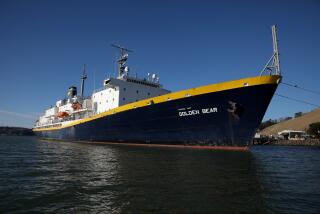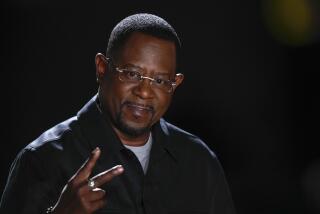State Department Admits It Missed Lawrence Clues
- Share via
WASHINGTON — The State Department officially acknowledged Friday that it missed conclusive evidence in its own files four years ago that the late M. Larry Lawrence, then a nominee to be ambassador to Switzerland, had fabricated his story of heroic World War II service in the merchant marine.
After a weeklong investigation, senior officials declared there was no doubt that the longtime Democratic donor and former owner of the Hotel del Coronado near San Diego concocted the story, and they conceded that the tale’s falsehood was clear in 1993 from junior college transcripts showing Lawrence was at school when he claimed to be aboard a ship running supplies for Russia.
While no one will be disciplined for the oversight, officials said they intend to tighten the system of running background checks on diplomats.
“We did not connect Ambassador Lawrence’s attendance at a junior college with his claimed voluntary association with the merchant marine,” acknowledged one senior State Department security official who declined to be identified. “They simply did not make the connection.”
The definitive document was a transcript showing that Lawrence was at Wilbur Wright Junior College in Chicago in March 1945, when he claimed to have been on the liberty ship Horace Bushnell in the Arctic Ocean. Lawrence claimed he suffered a serious head injury when the ship was torpedoed by a German submarine.
Lawrence has been the most publicized figure in a monthlong brouhaha over the Clinton administration’s grants of special waivers to permit burial in the crowded Arlington National Cemetery. After he died in January 1996, while serving his ambassadorship, Lawrence received one of the waivers, even though he did not meet the cemetery’s criteria. Administration officials stoutly defended the waiver, pointing to his wartime record.
But as it became clear that the record was false--and in the face of protests from veterans’ groups and others--Lawrence’s remains were removed Thursday at his widow’s request from a plot near the Tomb of the Unknowns and shipped to a San Diego-area cemetery for reinterment.
The State Department review suggested that government investigators made relatively little effort to verify Lawrence’s claim of merchant marine service.
In checking his background after Clinton nominated him for the ambassadorship, the investigators were unable to verify Lawrence’s service from Coast Guard or other official sources. Coast Guard officials told investigators that temporary, “volunteer” seamen--as Lawrence described himself--did not formally enlist with the merchant service and thus were not named in any lasting record.
State Department officials said there was no evidence in the files that Lawrence had offered any proof to establish that he had served on a succession of merchant ships, as he contended. Nor did investigators bring up the question with the 50 family members, friends and associates who were interviewed in the 24-day background investigation, the officials said.
The officials said investigators did not press for more evidence because no one had suggested that Lawrence’s account was untrue. “At that point, there wasn’t any belief that there was a discrepancy,” an official said.
And, in the State Department’s view, Lawrence’s World War II experience “was not as important as the more recent adult life issues that we were addressing,” such as his career in real estate and other business ventures, one official said.
One official acknowledged that the Lawrence case suggests that government investigators should “look at all documentation when they are unable to corroborate” some fact. In the future, “we’ll do that,” this official said.
Even so, the official said, “I don’t see anything in this particular case that professionally would argue that people should be disciplined for lack of attention, or anything else.”
In the past month, former friends and associates have spoken publicly about Lawrence’s tendency to exaggerate his achievements. But the 1993 background check seemed to come across no hints that Lawrence was not truthful at all times.
The file showed that the 50 people interviewed by investigators “all characterized him as honest, loyal, ethical, reliable and having integrity.” And though Lawrence’s ambassadorial appointment barely was approved by the Senate because of critics’ attacks on his lack of credentials, his relatives, friends and associates “all uniformly recommended him for the post.”
The government’s system of background checks, now under new congressional scrutiny because of the Lawrence case, has been frequently criticized in recent years for a lack of thoroughness.
The FBI, which handles most background checks, has been faulted for failing to come up with damaging and widely known information about several candidates for top jobs. It failed to report, for example, the history of marijuana smoking that forced federal appeals court Judge Douglas H. Ginsburg to withdraw from consideration for the Supreme Court in 1988.
More to Read
Sign up for Essential California
The most important California stories and recommendations in your inbox every morning.
You may occasionally receive promotional content from the Los Angeles Times.











